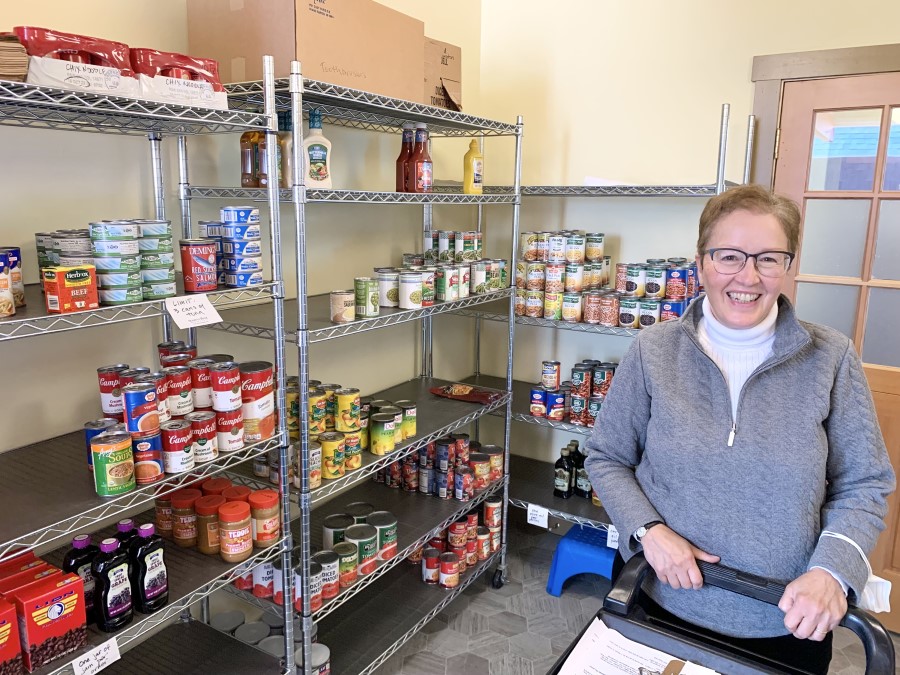PROVINCETOWN — The number of people relying on the Outer Cape’s food pantries has jumped by 64 percent this year, according to staff and volunteers of the Lower Cape Outreach Council. Particularly worrisome is that demand rose during the summer, which was historically the slow season at food pantries here.

“It used to be that as winter came and the work dried up, people would file for unemployment and come to us,” said Provincetown’s volunteer pantry manager Nicola Vichert. This year, she said, people who were working needed the food. “New clients kept appearing,” Vichert said. “It was our busiest summer ever.”
Provincetown’s food pantry served 37 families in September 2021 and 61 families in September 2022, Vichert said. Lower Cape Outreach Council CEO Katie Wibby said that the overall numbers for the nine pantries between Provincetown and Harwich went from 308 clients in January of this year to 503 in August.
The busiest single pantry was in Wellfleet, Wibby said, which served 113 families this September.
The food pantry program dates to the 1980s and primarily receives donated groceries from the Greater Boston Food Bank. Frozen meats and vegetables predominate, but there are also eggs, dairy, and fresh produce with a longer shelf life, such as potatoes, onions, and apples, Vichert said. A cash budget supplements the deliveries, allowing pantry managers to shop for extra essentials or locally popular items that the Food Bank doesn’t provide, like Caribbean soup mixes.
“The Boston Food Bank has had to cut back on what they can send us,” said Vichert, “because they’re having staffing troubles on their end. They’re sending us money to make up for it, but it doesn’t go as far.” Vichert said that with demand as high as it is, she’s been prioritizing proteins on her weekly buying trips to Stop & Shop.
The Lower Cape Outreach Council recently got a federal grant to help add more fresh produce to the pantries, said Wibby, but state and federal support is mostly the exception. Individual donors provide two-thirds of the organization’s budget, and foundations and religious groups provide most of the rest, according to the group’s public reports.
Because it primarily relies on private money, the Outreach Council has a particular niche in the ecosystem of Cape Cod nonprofits, Wibby said. In addition to the food pantries, the Outreach Council runs an $880,000 financial assistance program that can send small amounts of money out the door quickly.
“A great example: a transmission goes out on an income-earner’s car,” said Wibby. Without transportation, the person can’t get to work, and a precarious financial situation can quickly unravel.
“We can call the mechanic and tell them we’ll pay the bill,” said Wibby. “We can call Cape Cod Oil and ask them to deliver heating oil. We can pay Cape Cod Children’s Place for child care or buy a reclining bed for someone with a disability.”
The Outreach Council can approve these smaller requests relatively quickly, Wibby said. Around 150 “volunteer advocates” are trained to take these phone calls and make decisions, often the same day.
With Thanksgiving around the corner, though, the focus for November is food. Turkeys, groceries, and produce are being gathered now for clients to pick up on Thursday, Nov. 17, a week before the holiday.
The holidays can obscure for a time the lean reality of winter here. The rising need they saw this summer weighs on Wibby and Vichert.
“I’ve never seen anything like it,” said Vichert. It’s not just that there were more clients, she said. People were coming more often and putting more in their bags.
“Knowing that people are working, and it’s August, and they’re feeling this way — it’s hard,” said Vichert.



